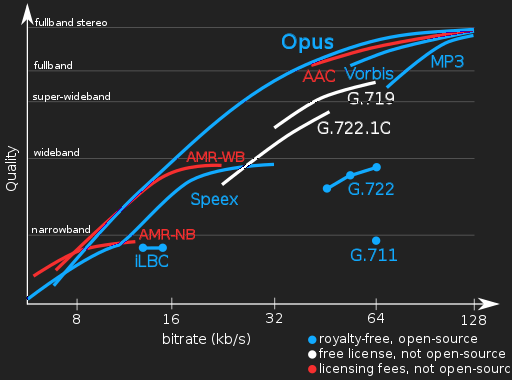Stop Using the MP3 Format
MP3 has been the dominant codec for digital audio for years. I find that slightly odd, given that it has been encumbered by patents for much of its lifetime. Most of those patents, if not all, have expired at this point, so the problem of one company controlling who can encode to, and decode from, the de facto standard format is gone. A fact we cannot escape, however, is that MP3 from a technological perspective is completely obsolete.
Consider how quickly information technologies advance in general. Computing as we know it today, did not exist two decades ago. We no longer use the same PCs, phones (even the Nokia 3310 did not exist yet) or web (arguably the web is still the same, but simultaneously not at all). We have invented “the cloud” (a.k.a. “lets upload all of our critical files to other people’s computers”), and are well on our way to kill off TV and newspapers with streaming and social media. Meanwhile, much of digital audio that is distributed today is encoded using a codec, the latest standard version of which is from 1998!
Merely being old does not inherently mean that a technology is bad. MP3 still being widely used suggests that the engineers who created it must have done something right. But with age, the probability of a technology being superseded by another increases. And that is my point. Since its creation, MP3 has been superseded, over and over again, by superior formats. They are technologically superior and some also in terms of licensing.
AAC (1997-2009)*, Vorbis (2000-2012), Opus (2012-2017) are probably the most notable replacements. They are all more efficient than MP3, and the latter two are completely free and open source. I am personally a big fan of Opus. It is free, low-latency, efficient, and immensely versatile, as can be seen from this indisputably scientific chart from Wikipedia (I have no clue how it came to be, but it fits my narrative). MP3 has been left in the dust.
The difference in quality is demonstrated in this audio clip, where we first hear uncompressed WAV audio, then Vorbis (which is inferior Opus) at 48 kb/s and finally MP3, also at 48 kb/s.
The only downside to Opus is the relative lack of software support. “Relative” is the key word here, though, as Opus compatible software definitely does exist (e.g. VLC, Audacious, modern web browsers and Vanilla Music for Android) and more is being made. Remember how information technology can change very rapidly? It could happen here too, if people only cared enough about their audio to insist on using good codecs.
* Year of initial version and latest version at the time of writing.
